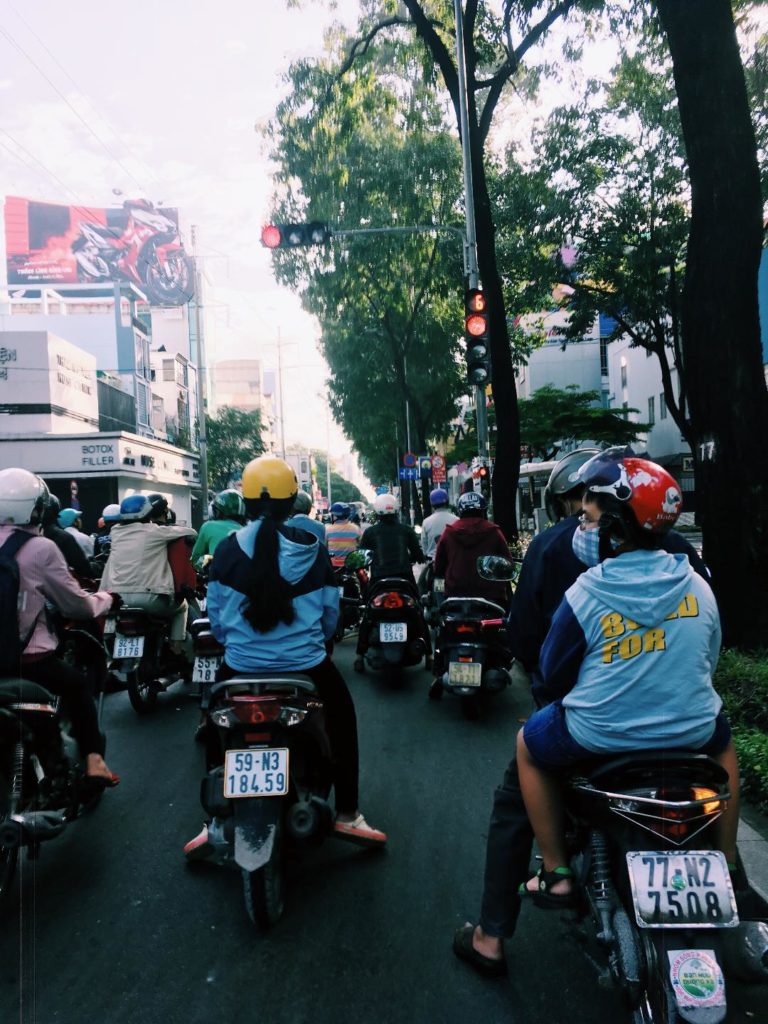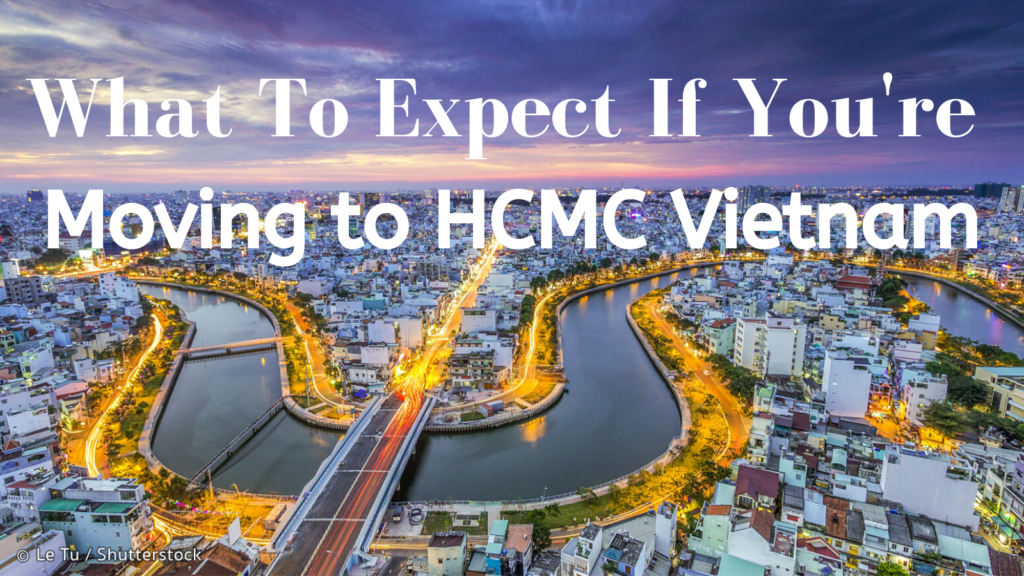Saigon is known for being the NYC of Vietnam, and quite possibly the craziest metropolis of all of Southeast Asia. It’s known as the city that never sleeps, marked by loud traffic and an insane nightlife scene that’s sure to keep any party-goer happy. There is a huge expat scene, with shared houses and fun bars abounding. While Saigon’s constant high energy can be igniting for some people, it can be draining for others. You either love it or you hate it; there is little room to fall in between in this chaotic capital.
Is HCMC Safe?
One of the first questions that comes to mind when someone is planning a move is the aspect of safety. For the most part, Saigon is very, very safe. The biggest risk factors are motorbike accidents and theft. Most of the motorbike accidents happen from driving too fast or not being aware of your surroundings. Most moto-taxi drivers are experienced and know how to handle the roads. If you decide to drive, I recommend getting a lesson with the company Ride with Me Saigon until you’re comfortable.
Robberies occur most often in the touristic areas of Nguyen Hue Walking Street and Bui Vien in District 1 and Thao Dien in District 2. This may be common sense, but crime usually happens in the areas where people are thought to have money. Be aware of your phone and purse especially on Bui Vien, the main bar street, at night as people are known to ride up on motorbikes and snatch phones out of people’s hands. I would also recommend getting a full face helmet or at least one that covers your eyes, as people on Fexpats- Female Expats in HCMC reported violent incidents of girls getting pepper sprayed while driving so that people could rob them. But these occurrences are quite rare and if you stay aware and cautious you should be fine.

HCMC vs. Hanoi
There is a lot of debate between which is better to live in: the South or North? From what I’ve heard, the people in Saigon are friendlier while the people in Hanoi can be a bit more cold and cautious of foreigners. Saigon has also gone more cosmopolitan while Hanoi is said to have retained more of its traditional roots. Hanoi still has the “Old Town” while HCMC’s Bui Vien & Walking Street have indeed been transformed with the times. The food is also said to be better in the North, and I myself can vouch for Bun Cha Hanoi style.
The climate also varies vastly between the two cities, HCMC having only rainy and dry season but being fairly hot year-round, while Hanoi has four seasons and can get quite cold in Winter. Rainy season goes from around June-November while the rest of the year from December-May are drier and hotter. But nearly all of the year is like a hot, sticky Summer in HCMC.

Visas
I’ve met a lot of people that work under the table and get paid cash, but the problem with this is that you won’t be able to open up a bank account or send money out of the country. In order to work legally in Vietnam, you first need a Business Visa Letter from your employer and a Work Permit as well. The Business Visa can last up to a year for Americans or 90 days for other nationalities and costs $50 for the stamp fee at the airport, as well as processing fees from your job or agent. The Work Permit should last 1-2 years and cost around 5 million dong or around $200. You can use a visa agent such as VietnamVisa4u to get the visa in order without committing to a company before arriving.
In order to avoid doing visa runs every 3 months, many people get a Temporary Residency Card (T.R.C) which lasts 1-2 years and costs around 5 million or $200. The problem with this is that it’s sponsored by and tied to your company and in order to leave Vietnam you’ll need an “Exit Visa” from them as you can’t leave with the TRC. This scares me and is the reason I’d rather use the Business Visa in conjunction with the Work Permit. It’s more expensive but I think it’s worth it for the peace of mind knowing I can leave on my own accord. Any visa is going to be tied to your job most likely so if you leave your job, you lose your visa and have to pay all over again.
Working in HCMC
The most popular jobs for expats in HCMC are teaching English, but I lived with people from different nationalities doing things from Fashion Design to Hospitality. It’s fairly easy to get a job, especially teaching English, because the demand is huge– not many Vietnamese people can speak English. This of course is a double edged sword as it makes communicating with locals very difficult.
If you decide to teach English, you must decide on public school or private. In public schools, you work regular 9-5 hours and have classes of up to 40 students. You also get paid a bit more (around $2000/month) but have to deal with low-tech classrooms, some even without air-conditioning. In private language centers, your hours will be irregular, mostly weekends 8 am-7 pm and week nights 5 pm-9. Your class sizes will be smaller, around 16 students, and the pay is slightly lower around $1500/month. Given that I only teach 21 hours maximum a week I think this is a fair wage. Some reputable public school companies are EMG and private schools ILA or Apax (who I work for).
Cost of Living in HCMC
One of the biggest motivating factors for people to move here is the extremely cheap cost of living. It makes moving here almost fool-proof, because it’s easy to find a job and afford the basic necessities (and then some). In my first shared house in District 3 which was about 1 km from my job, I paid around 7 million dong or $300 a month which included having my own room & bathroom, a maid 3 times a week with laundry service, and being in the center of town. Right now I pay about 5.5 million or $250 a month for a much bigger room in a house in Nha Trang. Going out to eat is fairly cheap, with a nice Western meal costing about $5 and a nice Vietnamese meal costing about $2.50.
I have been tracking my expenses for about 3 months now, so these are the averages broken down into categories. Each month I spend about $100 on food from restaurants, $60 on groceries, $40 on drinks like coffee and alcohol, $30 for shopping, $13 on petrol, $40-50 for a bike rental, and $30 on grab. This comes out to about $300 on variable expenses per month. Traveling is my weakness (obviously because this is a travel blog) and usually I budget about $500 per trip. So far I’ve gone to Bali twice, Cambodia, and Malaysia. I also like to take little trips to places like Vung Tau, Mui Ne, and most recently Ninhvana in Ninh Vinh Bay. If it weren’t for traveling, I would’ve saved a lot more money. On the other hand, I always have the best experiences traveling and if there’s one thing I’d like to invest in it’s experiences.
Public Transportation

In Saigon, public transportation is virtually non-existent with the exception of the city bus from the airport. If you live in D3 or D1 it can drop you off close to home and only costs about a dollar. For day to day transport, however, the most popular way to get around is by scooter. I recommend learning how to drive one and renting or buying if you plan to stay long term. I learned automatic but semi-automatic or manual would also be useful to learn.
Since traffic is truly horrendous in HCMC, I wouldn’t recommend trying to get around by car. I used to say that you couldn’t even pay me to drive a car in the city. It takes much longer and you constantly have to stop for motorbikes pulling out in front of you. In this city, bikes may be the smallest vehicle on the road but they come first.
What I Wish I Would’ve Known
Vietnam was a big question mark for me from the beginning of January of 2019 up until I moved here this past June. I wish I would’ve been more honest with myself about how much I like living in a big, crowded, polluted city because HCMC is all of those things. Be careful of where you decide to move if noise pollution bothers you: if your apartment or house is close to a construction site there will be loud noises starting from around 7 am in the morning till the evening. There are karaoke bars which only add to the noise level as well. On the bright side, the nice thing about moving to a big city in SEA is that you’ll be welcomed into a big expat community of people doing the same things as you. And if you like to go out, you’ll definitely love Saigon. While it can be crazy, it can also be exciting and thrilling living in one of the biggest cities in Asia. Make the plunge, join some Facebook groups, put yourself out there and I think you’ll have the best time.
If you have any questions about HCMC, Vietnam don’t hesitate to ask in the comments.
With Love,
Cierra
P.S. I moved out! I traveled up the Vietnamese coast to a small city called Nha Trang, pronounced with a nasaly-twang that only the Vietnamese can master. I like it here, and the past week has been a much welcome slow-down with less traffic, less noise, and more time to just be. I’ve spent a lot of time chilling in my hotel room, going to the beach, and even managed to make a few friends. Let’s see how I like it with the passage of time, once “reality” sets in.


Pingback: Cierra's Story - Young Broke Traveler